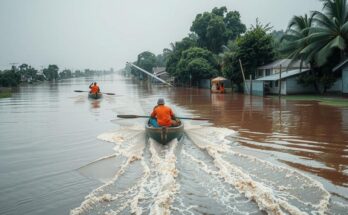Cyclone Chido has hit Mayotte, marking the most intense storm in 90 years, resulting in at least 22 deaths and widespread destruction. Climate change is amplifying cyclone severity in southeast Africa, where the cyclone season lasts from December to March. Insufficient weather tracking systems further exacerbate the situation, with the UN launching efforts to improve early warning capabilities.
Cyclone Chido has struck the Indian Ocean archipelago of Mayotte, causing significant devastation and loss of life. It is reported to be the most powerful storm to hit the French territory in 90 years, claiming at least 22 lives. The cyclone made landfall on Saturday, bringing with it fierce winds that destroyed entire neighborhoods, severely damaged infrastructure, and uprooted numerous trees. This incident underscores a worrying trend of increasingly severe storms affecting the southeast coast of Africa, a situation exacerbated by climate change driven by human activities.
The cyclone season in southeast Africa typically spans from December to March, coinciding with the warmest sea surface temperatures in the region. Recent years have seen the emergence of powerful storms, including Cyclone Freddy in 2023 and Batsirai in 2022, which impacted multiple nations in the area, including Malawi and Mozambique. In the Indian Ocean and Australia, these storms are referred to as cyclones, while in other parts of the world, they are known as hurricanes.
Research indicates that climate change contributes significantly to the severity and frequency of such cyclones. The planet’s average temperature has risen by 1.3 degrees Celsius since pre-industrial times, resulting in higher sea surface temperatures. These conditions facilitate the formation of cyclones, with Chido experiencing ocean temperatures around 29 degrees Celsius. The increased warmth leads to more intense storms characterized by stronger winds, increased precipitation, and more severe storm surges.
A considerable challenge in managing these disasters is the lack of sufficient weather data and forecasting capabilities across much of Africa. Current statistics show that the continent possesses only 37 radar facilities for weather tracking, a stark contrast to Europe and North America’s 347 and 291, respectively. This deficit hampers early warning efforts, leaving vulnerable populations ill-prepared for approaching storms. Consequently, the death toll from cyclones can be catastrophic, with events like Cyclone Idai in 2019 resulting in over 1,000 fatalities.
In light of these challenges, the United Nations initiated a project in 2022, aimed at ensuring global access to early weather-warning systems within five years. Celeste Saulo, the secretary-general of the World Meteorological Organization, has emphasized the critical need for improved access to weather forecasts in the ongoing battle against climate change impacts.
Cyclone Chido has brought attention to the increasing intensity of storms affecting the southeast coast of Africa, which is believed to be a consequence of climate change. The warmer ocean temperatures, resulting from human-induced climate change, serve as a catalyst for these destructive cyclones. The frequency of such storms has become a matter of concern, as evidenced by a series of severe cyclones impacting the region in recent years. Furthermore, the lack of proper weather forecasting infrastructure complicates disaster preparedness and response efforts in vulnerable countries.
In conclusion, Cyclone Chido’s impact on Mayotte highlights the growing threat of severe weather events fueled by climate change. The combination of rising ocean temperatures and inadequate forecasting capabilities poses major challenges in mitigating the effects of such cyclones. The ongoing efforts by the United Nations to establish comprehensive early warning systems are essential for safeguarding communities against future storms, underlining the urgency in addressing climate change and enhancing weather preparedness in the region.
Original Source: www.seattletimes.com




